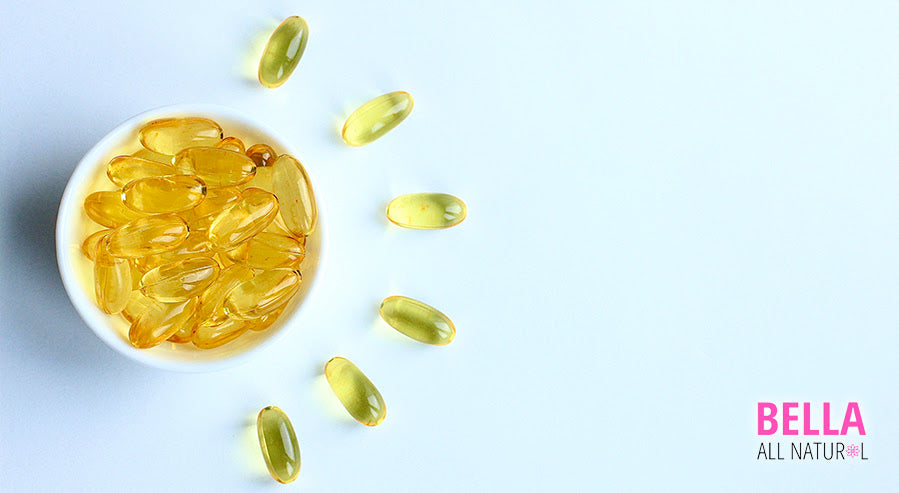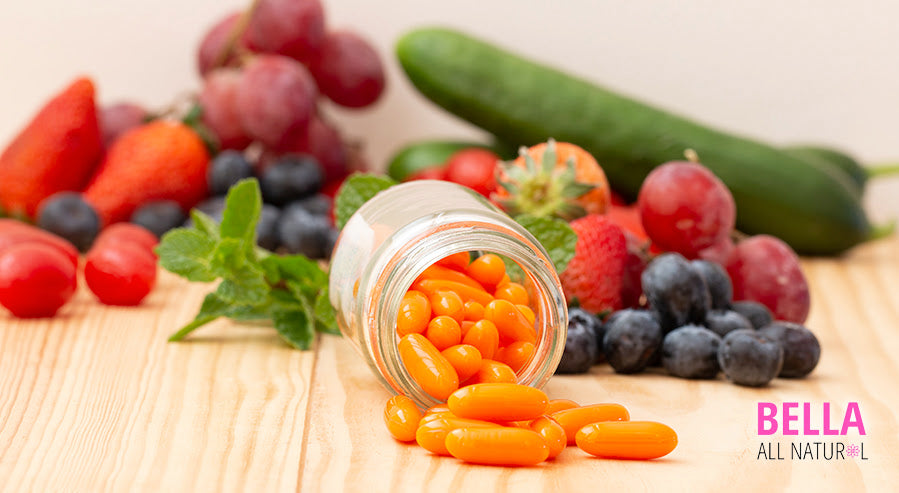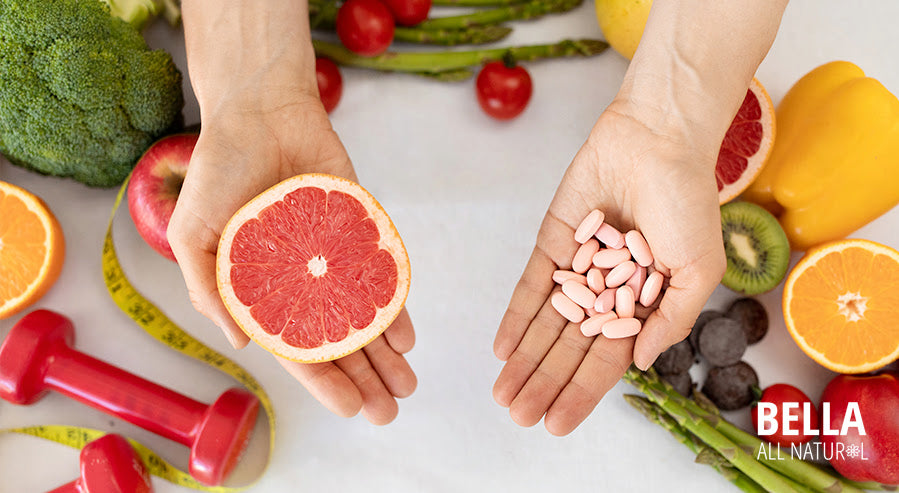

Do you find vitamins and their change in health fascinating? I'm here to give you a thorough lowdown on vitamins, backed by intense biology and nutrition research. Let's talk about water-soluble vitamins and fat-soluble vitamins; these are two groups that play a big part in how nutrients work in our bodies.
Confused about the difference between the two? Don't worry, I was too. But mastering this difference could dramatically shift the way we eat - and, finally, how healthy we are. By the end of this friendly chat, you'll have a sound understanding of the vitamins your body needs and solid plans to add them to your daily diet.
Ready to talk about the space of water-soluble and fat-soluble vitamins? Let's break it down, one piece at a time, shall we?
What Are Water-Soluble Vitamins?
Water-soluble vitamins dissolve in your body, streamlining their access to your bloodstream during digestion. They don't need carriers or bile acids for absorption like their fat-soluble counterparts.
I'm talking about B vitamins and vitamin C; they fall into this category. There's a web of eight different B vitamins important in metabolism and red blood cell production. But what about vitamin C? Its main job involves boosting the immune system, promoting iron absorption, and supporting collagen formation. Pretty important things for your skin firmness, joint health, and blood vessel functioning, right?

Here's the thing with these water-soluble vitamins - they aren't stored in the body. Instead, your urinary system quickly flushes them out. Even though this exit prevents any pile-up in the body, it doesn't mean you should go crazy with the intake. Too many could cause health problems, like a niacin flush or nerve damage from too much vitamin B6.
Constant replenishment of these vitamins is needed as they don't stick around. A balanced diet of fruits, vegetables, and whole grains usually provides what you need - but with certain health conditions, you might need a bit more.
Overlooking these important micronutrients could have consequences you don't want to deal with. Low levels of B vitamins may trigger fatigue, anemia, depression, or even nerve damage. And scurvy? That could occur if you lack vitamin C, leading to anemia, weakness, swelling, and ulcerations. It paints a pretty clear picture - regular intake of water-soluble vitamins is important to keep your body running smoothly!
What Are Fat-Soluble Vitamins?
Did you know your body tucks away vitamins A, D, E, and K for later? Yup - they dissolve in fat and get stored in fatty tissue. That's different from water-soluble vitamins, which your body gulps down right away. Pretty cool, right? And guess what else? Eating fats can boost how well your body hangs onto these vitamins.
Let's break it down, shall we? Vitamin A - here's a team factor. It keeps your vision sharp and your immune system impressive. And vitamin D? It's the calcium cheerleader, boosting strong bones and teeth. Vitamin E comes in as a bouncer for your cells, tossing out potential troublemakers. Last but not least, vitamin K gets busy helping your blood clot, which is a powerful option when it comes to healing.

It might be tempting to say, 'these vitamins sound important, I'll pile on!' But be cautious. Too much of them can cause toxicity symptoms since they stick around in your body. Go overboard with vitamins A or D in the long term, and you could be looking at anything from a mild case of nausea to hair loss or kidney damage - no fun at all.
Now don't get me wrong, daily doses are not a must; your body can dip into its reserves. But here's an important nugget for anyone eating a low-fat diet: these fats play an important part in helping your body hold onto these vitamins. So you might not absorb as much. My advice? Dig into balanced meals with enough fats - that's how you keep pockets of vitamin goodness for when you need them.
Isn't it in balance, though? Guzzle too much, and you tip towards toxicity; skimp, and you're risking deficiencies. I think finding that sweet spot with your daily dose of these fat-soluble vitamins is your ticket to their health benefits. You have this!
Are Water-Soluble Vitamins Better Than Fat Soluble?
It's an exercise in understanding, not a competition, to recognize the difference between water-soluble and fat-soluble vitamins. Each type has characteristics important for our health. The main contrast is in how they're absorbed, stored, and expelled by our bodies; it's not a case of which has better benefits.
Let's talk specifics. Your body absorbs and uses water-soluble vitamins with ease. The catch? Since our bodies can't store them, we have to keep taking these vitamins through our diet. One oddball is Vitamin B12; it can relax in your liver for pretty long.
On the flip side, fat-soluble vitamins need a little help from dietary fats to be absorbed. Their home base? Your liver and fatty tissues, meaning you don't need to ingest them daily. But watch out; their knack for long-term storage can build up to concerning levels if you consume too much.

So, who's the winner in this vitamin face-off? Relax and don't sweat it; there isn't one. Each group stands as a pillar in the construction of our nutrition and bodily functions. Fat-soluble vitamins stand up for our vision, bone strength, and blood clotting, while water-soluble ones chip into energy production and maintain the health of nerves, skin, and red blood cells.
Where do we find these useful supplements? The two groups play hide-and-seek in different spots. Fat solubles secretly dance in fatty foods and oils; in contrast, water solubles hang out in fruits, veggies, meats, and grains. Remember - feasting or avoiding any food type too much? Not a good idea.
So, when you're planning your meals, avoid siding with one group and snubbing the other; instead, shoot for balance between these two vitamin types. Fill up your plate with various foods to get the benefits from both sides. The deal is about striking a balance. Remember - be conscious of this delicate dance between different vitamins and your food habits while enjoying your meals. Every vitamin type has its unique gifts to offer to our overall nutrition.
What is the Part of Solubility and Absorption?
Understanding how solubility affects vitamin function requires a basic knowledge of chemistry. This talks about how our bodies deal with various nutrients, honing in, especially on the bond between water and fat.
Water-soluble vitamins are composed of vitamin C and B complex vitamins. They make their way quickly into your bloodstream. What happens next is pretty cool; they dissolve in water, which lets your body use them right away. Got extras? No worries - your kidneys kick in to clear out any overflow. These vitamins really don't stick around in your tissues, so it's up to you to keep replacing them every day with food. Why's that? Well, you have to keep an eye on the daily dose of these vitamins if you want to stay healthy.
On the flip side, fat-soluble vitamins - we're talking vitamins A, D, E, and K - take their own sweet time getting processed along with dietary fats. Great news: these can store up in your body's fat tissue and liver for when you need 'em later. Think of this as their help; they last longer in the body. But there's a catch: while this storage superpower can come in pretty useful (as you don't need to consume these vitamins quite as often), excessive amounts could lead to a harmful buildup, maybe even toxicity.

Here's yet another reason this storage thing matters: it affects how these vitamins do their job. You see, any long-lasting bodily processes - think vision, bone health, your immune system - can lean on these stored-up, fat-soluble vitamins when needed.
Ready to bring it all home? Here's my take on how to handle your vitamin intake day by day: if you want something that's absorbed fast and ready to use, keep these water-soluble vitamins coming. But for the fat-soluble crew? Think more long-term: slower absorption, fewer helpings- given their pace and storage know-how. Bottom line? Managing your nutrient intake means getting the balance right.
How Does Storage and Risk of Toxicity Change Intake?
Your body can stash away fat-soluble vitamins like A, D, E, and K right in your fat tissues and liver. They can even step in as a supply backup if your diet is lacking. But remember, this storage method can push vitamin levels into the danger zone if you're chowing down on these vitamins too much.
Did you ever realize overdoing the vitamin game can lead to something called hypervitaminosis? Supplements can quickly turn from a casual health boost into a sneaky health risk if you're piling them on instead of sticking to a balanced diet. I'll lay it out for you: top off on Vitamin A, and you may just land yourself with funky skin tones and messed up bones.
Overdosing on Vitamin D - a rare but real thing - can result in hypercalcemia, leaving you feeling nauseous, losing your appetite, and dealing with kidney stones. Too much Vitamin E? You're at risk of bleeding and clotting snafus. Vitamin K usually keeps it pretty relaxing, but too much can mess with certain blood thinners.

Let's switch gears and chat a bit about water-soluble vitamins; you know the ones, B-vitamins, vitamin C. Here's the deal: your body can take the extra and kick it to the curb, reducing the toxicity danger. But - and this is a big but - even they are not the superheroes they seem to be all the time. Too much Vitamin B6 could potentially mess with your nerves, and suddenly taking too much Vitamin C can lead to stomach cramps and a bout of diarrhea.
Remember, knowing the difficult scene of vitamin toxicity matters, people! Play it safe, my friend. It scares me to think about people diagnosing their deficiencies or designing their supplement routines without chatting up a healthcare pro first. And remember, vitamins aren't only about how much.
Balance is important, too; it's all part of the ride to improve your health game.
The Functions and Sources of Both Vitamins
B vitamins and vitamin C, you have to take note, are water-soluble and majorly important for the powerhouse of your body to work well; they should be a staple gig in your day-to-day grub. Your body needs whole grains - B vitamin champions - to break down carbs, proteins, and fats and create energy. At the same time, Vitamin C has its own turf; it improves antioxidant action, teams up with collagen to make space for itself, and makes friends with iron! You should cram lots of fruits, vegetables, and grains into your daily meals - they're bursting with these vitamins.

Unlike their water-soluble cousins, vitamins A, D, K, and E have a thing for fat. They each work differently: Vitamin A gives a leg up to good eyes and bones; D loves hooking up calcium and phosphorus to build sturdy bones; K is your favorite for clotting - important for healing; lastly, E shields your cells from rude free radicals - and it's quite a vegetable oil buff! You'll find these fat-soluble vitamins in foods like animal products, certain oils, and, of course, vegetables. So, you might want to throw these specific items into your menu.
Here's the lay of the land: Fat and water-soluble vitamins - both are non-negotiable for your body, each dancing to a different beat. Important differences? They lie in their roles, sources, and how your body gets down with them. Some look out for your energy release and cell functions, while others go all out for bones or play gatekeeper to your cells. Spreading the net wide on your food sources and dropping in your meals and snacks can help keep your health on the top shelf. But, keep in mind - You should know that just knowing this thing won't cut it. So what counts, you ask? Getting into the game and mixing it up! The bottom line is choosing your food is a big deal!
The Water and Fat Soluble Divide
It's important to know the difference between water-soluble and fat-soluble vitamins for your own wellness. You need both types of vitamins; each does a really important job of keeping your body working in top shape. You have to constantly take in water-soluble vitamins due to their swift absorption and quick removal from the body. But fat-soluble vitamins can hang around - stored for later use - but you have to watch out for any excessive buildup to prevent harmful toxicity. Isn't it really important to keep an eye on how and what kinds of vitamins you take, and how many, too?
So, you've grasped the importance of this knowledge - but that's just the beginning. Does real progress towards all-around health kick-off when you apply this understanding? You betcha!

Bella All Natural (that's us!) is eager to join your process, converting understanding into action and helping you create a health and wellness schedule. Gaze in wonder at our large pick of products that clearly showcase our fervor and energy if you want to join up your newfound knowledge with action.
Need an example? We have detox kits for a good clean-out, Skinny Iced Coffees for those needing a metabolism boost and weight-loss help, and natural beauty and skincare items serving a variety of desires. Also - you'll love this - our top-of-the-chart Constipation Relief Kit fanning the flames of good digestive health. Check out our store today!



